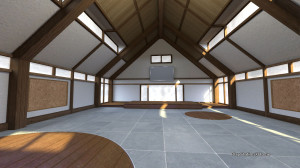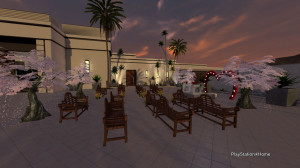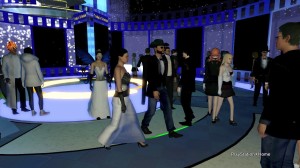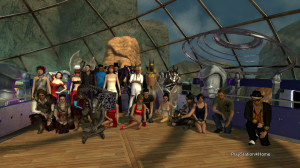Why Do Some Clubs Fail?
by Burbie52, HSM team writer
The very first article I wrote for this magazine was about my club, the Grey Gamers. It’s now over two years old, and a force of its own. I no longer have to look for people to join us; they find us through friends who attend, or they seek us out. I gain one or two new people a month this way; sometimes more. It all started with a need I saw in Home for a club where people who are older than thirty (with a few exceptions) could get together weekly and meet others who had the same interests, knowledge base and maturity. It’s been very successful so far, as it continues to grow and thrive.
I’ve spoken to many clubs in Home and written about a few of them; some I’m a member of to this day, like Incognito, while others had interests and purposes different from my own. They were all successful — and it made me start to think about why some clubs fail when others thrive. I think I’ve seen a pattern emerge for what makes them successful, versus those which fail.
Before beginning: I also have another club that I consider a failure. I started a club with the intent of giving people who wanted a wedding in Home a place to have it. The club has no regular members in it, and it has failed. I think this is because the idea was a bit unusual — a club that people could use for a day to conduct a wedding and after-party. I guess that Home either wasn’t ready for such an idea, or people really didn’t want to do it. Or, perhaps, those users who are sufficiently motivated to play in Home’s social scene to the extent of going through a marriage ceremony might be the same user group who already own their own clubhouses. Either way, I am going to disband it soon, as it sits empty and forlorn, serving no purpose.
The first thing that will cause a club’s failure — or at the very least extremely slow growth — is too many rules. I for one come into Home to have fun, as I am sure many or most people do. Home is a place of refuge from the outside world for many, and when a club tries to impose too many rules on people, something they already have in the real world, I think it is a path to either destruction or stagnation. While rules might work for the fams or mafias that have sprung up in Home (and, even then it arguably doesn’t), most people want to get away from that and relax here, not be told what they can and cannot do. In the Grey Gamers, we have some very simple rules and they have always worked for us:
- Have fun.
- Be nice (respect others).
- Mingle and get to know each other (that’s the point).
- No Drama. You need to keep it simple.
That last one is a very important one because drama is probably one of the biggest causes of club demise. It is a fact that when you bring an eclectic group of individuals together you are going to, at times, have people who either rub each other wrong, or simply come to have issues with one another. When this happens it has to be a cardinal rule that it is something that happens only outside the club meetings and events or it will be a cause for disaster.
What happens whenever you get a group of people together is they end up making friends within the group, and when there is drama involving two of them, it polarizes the friends in the club on either side of the issue. This will tear a club apart quickly, as one of the things that a club needs to have is unity in not only goals and purposes, but also an environment without tension. It needs to be a place people want to hang out together and have fun or it will die.
The third thing I have seen that is absolutely essential in a club is purpose. My clubs purpose is to bring mature people together so they can get to know others like themselves in Home and many of them have found great friendships because of it, myself included. If your club has nothing to focus on together, it will quickly die. I belong to a fashion club (Rich Girls of Home), Incognito — which discusses the weekly content updates and has numerous events for the participants to do — Quanimus Films, which is for machinima making, and of course HomeStation for this magazine. All of theses are very successful because they have a purpose to fulfill each week.
Event planning is time consuming and can be hard to organize, so if you don’t have the time or energy to do these types of things, you might want to try a club that focuses on other things like games in or outside of Home. There are certainly enough of those to choose from. All that matters is that you have some reason to exist and be together.
All of these things either make or break a club. My club is an effortless thing for me to manage now. All I do is go into Home each Friday night and collect my people and we dance the night away. I have themed parties like movie stars or beach gatherings and people are happy because they can be creative and spend time with their friends or make new ones.
As a club owner, your member’s happiness should be your main concern. Clubs need to be about an ideology or purpose that many people see, rather than an extension of one person’s whims. To this day, clubs really are the most broadly social aspect of user-generated entertainment in Home, and a club which does not have a compelling purpose to exist, along with a fun atmosphere for its members to enjoy, may ultimately fail.
Share
| Tweet |






Some good advice here Burbie. I have a clubhouse in NA but wasn’t even considering what (if any) it’s purpose should be. In fact, I kinda bought it coz it was the closest you could get to a nightclub in Home at the time, that didnt require my friends to spend money to access. Oh, and also as a small workaround that people could change clothes while all in a private space.
I dont think anyone goes there, I know it’s been months since even I visited lol. If I thought of anything I’d like to do with it though then at least it’s there should I need it.
Another reason clubs might fail is the inability to have an adequate leadership system. I ran a weekly open mic on home for poets and musicians the roster rotated constantly -so I was adding and deleting constantly -plus dealing with internal complaints about other parties (which were relatively few as most of the were mature people) plus I would recruit new members as either audience or participant -- on a weekly basis it took is toll on me- I tried having a sub leader but very few would show up when I personally was not there. It is easy to get burnt out if the responsibility is not shared with other people… A club has to me self-motivating by an entire group of people -not just one person. There were so many other things I wished to pursue on home and running the club became a full time job- I am thinking about starting it up again… But I will need adequate help with leadership to do this -so if I go on vacation the thing doesn’t fall apart.
Thank you for yor insights Burbie -this is a great subject.
There are other uses of club spaces than for large social gatherings. My club space contains a maze, refined over several trial runs with friends, who I then ‘promote’ in the club so that they can bring in others friends to have a go. I’ve another maze developing in a personal space that I hope to transfer to the club space soon!